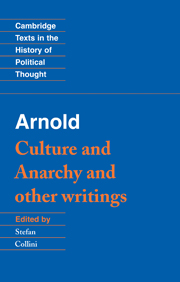Book contents
- Frontmatter
- Contents
- Introduction
- Chronology
- Bibliographical note
- Note on the texts and acknowledgements
- DEMOCRACY (1861)
- THE FUNCTION OF CRITICISM AT THE PRESENT TIME (1864)
- CULTURE AND ANARCHY: AN ESSAY IN POLITICAL AND SOCIAL CRITICISM (1867–9)
- Introduction
- 1 Sweetness and Light
- 2 Doing as One Likes
- 3 Barbarians, Philistines, Populace
- 4 Hebraism and Hellenism
- 5 Porro Unum Est Necessarium
- 6 Our Liberal Practitioners
- Conclusion
- Preface to Culture and Anarchy (1869)
- EQUALITY (1878)
- Index
- Cambridge Texts in the History of Political Thought
5 - Porro Unum Est Necessarium
Published online by Cambridge University Press: 05 June 2012
- Frontmatter
- Contents
- Introduction
- Chronology
- Bibliographical note
- Note on the texts and acknowledgements
- DEMOCRACY (1861)
- THE FUNCTION OF CRITICISM AT THE PRESENT TIME (1864)
- CULTURE AND ANARCHY: AN ESSAY IN POLITICAL AND SOCIAL CRITICISM (1867–9)
- Introduction
- 1 Sweetness and Light
- 2 Doing as One Likes
- 3 Barbarians, Philistines, Populace
- 4 Hebraism and Hellenism
- 5 Porro Unum Est Necessarium
- 6 Our Liberal Practitioners
- Conclusion
- Preface to Culture and Anarchy (1869)
- EQUALITY (1878)
- Index
- Cambridge Texts in the History of Political Thought
Summary
The matter here opened is so large, and the trains of thought to which it gives rise are so manifold, that we must be careful to limit ourselves scrupulously to what has a direct bearing upon our actual discussion. We have found that at the bottom of our present unsettled state, so full of the seeds of trouble, lies the notion of its being the prime right and happiness, for each of us, to affirm himself, and his ordinary self; to be doing, and to be doing freely and as he likes. We have found at the bottom of it the disbelief in right reason as a lawful authority. It was easy to show from our practice and current history that this is so; but it was impossible to show why it is so without taking a somewhat wider sweep and going into things a little more deeply. Why, in fact, should good, well-meaning, energetic, sensible people, like the bulk of our countrymen, come to have such light belief in right reason, and such an exaggerated value for their own independent doing, however crude? The answer is: because of an exclusive and excessive development in them, without due allowance for time, place and circumstance, of that side of human nature, and that group of human forces, to which we have given the general name of Hebraism.
- Type
- Chapter
- Information
- Arnold: 'Culture and Anarchy' and Other Writings , pp. 138 - 152Publisher: Cambridge University PressPrint publication year: 1993

